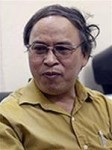 BY CHRIS BRUMMITT, THE ASSOCIATED PRESS JUNE 13, 2013 10:10 PM
BY CHRIS BRUMMITT, THE ASSOCIATED PRESS JUNE 13, 2013 10:10 PM
HANOI, Vietnam – Vietnamese police have arrested one of the country’s best known bloggers for posting criticism of the communist government, intensifying a crackdown against Internet-fuelled dissent in the one-party, authoritarian state.
 The arrest of Pham Viet Dao, 61, indicates the level of concern in the Communist Party over the threat posed by Internet activism in a country where until a few years ago it had a monopoly on information. Now, scores of blogs and Facebook report gleefully on its failings and internal feuding, reaching millions of people.
The arrest of Pham Viet Dao, 61, indicates the level of concern in the Communist Party over the threat posed by Internet activism in a country where until a few years ago it had a monopoly on information. Now, scores of blogs and Facebook report gleefully on its failings and internal feuding, reaching millions of people.
So far this year, 38 bloggers or democracy activists have been arrested, close to the same as in the whole of 2012. Foreign governments, led by the United States, have criticized the crackdown and called for the activists’ release but have little leverage to force Hanoi to change tack.
Dao was arrested from his home in Hanoi on Thursday for the offence of “abusing democratic freedoms,” the Ministry of Public Security said on its website. That violation of Article 258 of the Penal Code carries up to seven years in prison.
Dao, a former government official and member of the Vietnam Writers Association, ran a website where he had written posts critical of Vietnamese leaders. The site was not available Friday, apparently blocked by the government.
“This is horrible. Who will be next?” said Nguyen Quang A, an economist and outspoken critic of the government.
“They want to show that you have to shut up your mouth. When somebody is weak and wants to appear to be strong, he does things like this.”
The government is under pressure because of its mishandling of the stuttering economy, once one of Asia’s brightest. Well-connected state-owned enterprises have been allowed to run up massive debts over the last few years, while producing little of value, dragging down the economy.
In televised testimony on Thursday to the lawmaking National Assembly, a government minister said the Internet has brought huge benefits to Vietnam since it was introduced there in 1997, but he warned of the negative impact of online dissent.
“Recently, opportunist elements in the country and the overseas hostile forces have abused the Internet to spread information that sabotaged the country, distorted the policy of our Party and state,” Minister of Information and Communications Nguyen Bac Son said.
Vietnam has 31 million Internet users, some 73 per cent of them younger than 35. Vietnam’s population is 90 million.
Unlike China, the government is unable to enforce a firewall or efficiently block access to websites. Vietnam’s problems are now compounded because Internet business and commerce are important for future economic growth, yet cracking down on Internet freedom would also cut into that prospect.
American Internet firms like Google and Facebook want to do more business in the country, but are wary of the regulatory environment. Dao’s blog appeared to be hosted by blogger, Google’s blogging platform, highlighting the problems.
Another well-known blogger was arrested last month for the same charges as Dao. He has yet to face trial. Other bloggers have been imprisoned for up to 12 years so far this year. The government says no one has been jailed for peacefully expressing their views, only those who break the law.[subscribe2]
Height Insoles: Hi, I do believe this is an excellent site. I stumbledupon …
http://fishinglovers.net: Appreciate you sharing, great post.Thanks Again. Keep writi…
Achilles Pain causes: Every weekend i used to pay a quick visit this site, as i w…






June 14, 2013
Vietnamese police arrest well-known blogger for criticism; minister warns of impact of dissent
by Defend the Defenders • Pham Viet Dao
HANOI, Vietnam – Vietnamese police have arrested one of the country’s best known bloggers for posting criticism of the communist government, intensifying a crackdown against Internet-fuelled dissent in the one-party, authoritarian state.
So far this year, 38 bloggers or democracy activists have been arrested, close to the same as in the whole of 2012. Foreign governments, led by the United States, have criticized the crackdown and called for the activists’ release but have little leverage to force Hanoi to change tack.
Dao was arrested from his home in Hanoi on Thursday for the offence of “abusing democratic freedoms,” the Ministry of Public Security said on its website. That violation of Article 258 of the Penal Code carries up to seven years in prison.
Dao, a former government official and member of the Vietnam Writers Association, ran a website where he had written posts critical of Vietnamese leaders. The site was not available Friday, apparently blocked by the government.
“This is horrible. Who will be next?” said Nguyen Quang A, an economist and outspoken critic of the government.
“They want to show that you have to shut up your mouth. When somebody is weak and wants to appear to be strong, he does things like this.”
The government is under pressure because of its mishandling of the stuttering economy, once one of Asia’s brightest. Well-connected state-owned enterprises have been allowed to run up massive debts over the last few years, while producing little of value, dragging down the economy.
In televised testimony on Thursday to the lawmaking National Assembly, a government minister said the Internet has brought huge benefits to Vietnam since it was introduced there in 1997, but he warned of the negative impact of online dissent.
“Recently, opportunist elements in the country and the overseas hostile forces have abused the Internet to spread information that sabotaged the country, distorted the policy of our Party and state,” Minister of Information and Communications Nguyen Bac Son said.
Vietnam has 31 million Internet users, some 73 per cent of them younger than 35. Vietnam’s population is 90 million.
Unlike China, the government is unable to enforce a firewall or efficiently block access to websites. Vietnam’s problems are now compounded because Internet business and commerce are important for future economic growth, yet cracking down on Internet freedom would also cut into that prospect.
American Internet firms like Google and Facebook want to do more business in the country, but are wary of the regulatory environment. Dao’s blog appeared to be hosted by blogger, Google’s blogging platform, highlighting the problems.
Another well-known blogger was arrested last month for the same charges as Dao. He has yet to face trial. Other bloggers have been imprisoned for up to 12 years so far this year. The government says no one has been jailed for peacefully expressing their views, only those who break the law.[subscribe2]